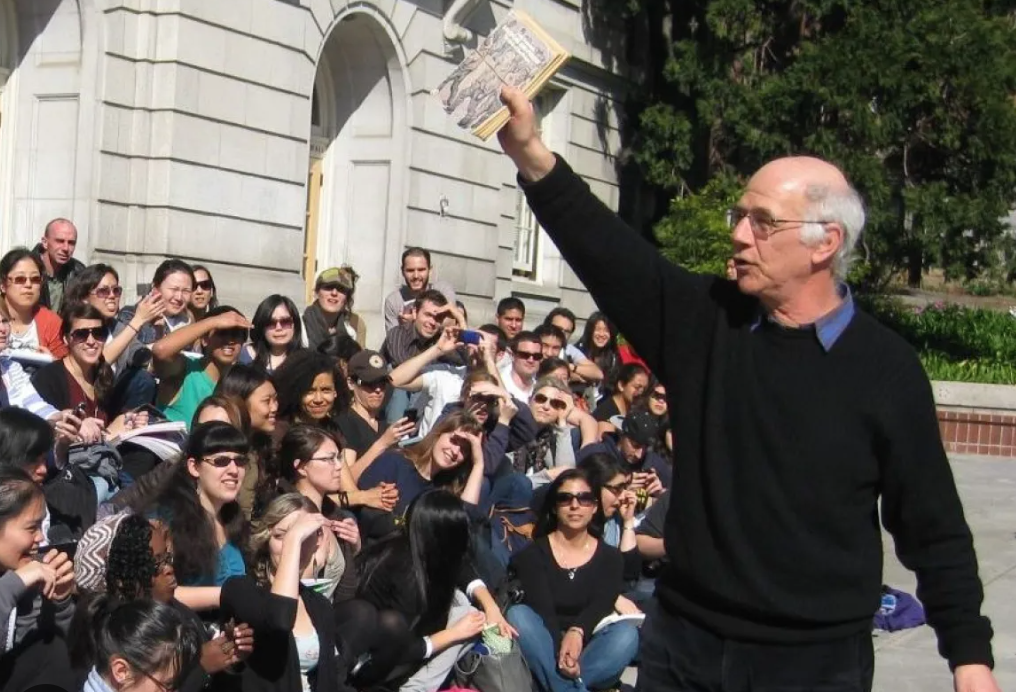Tribute to Michael Burawoy
Written by Joanna Reed, on behalf of the UC-AFT Bay Area Chapter executive board David Skolnick, Timothy Vollmer, Jose Adrian Barragan-Alvarez, David Walter, Balthazar Beckett, Nicholas Dehler, Sarah Rosenkrantz, Tehmina Khan, Joseph Klett, Anibel Ferus-Comelo, Ramona Collins, Margi Wald, Jennifer Nelson, Cameron Clark, Catherine Bordel, Khalid Kadir, Barbara Barnes
We, the members of UC-AFT, the union that represents lecturers and librarians across the UC system, wish to express our profound sadness and grief at Michael Burawoy’s passing. Michael was an unrepresented member of our union for decades, which speaks volumes in expressing his support for lecturers’ struggles for living wages, more secure working conditions and for the recognition of our contributions and membership in the university community. Michael worked to break down barriers across diEerent faculty job titles and hierarchies to emphasize our common ground in the face of the ongoing neoliberalization of higher education. Through his work as Berkeley Faculty Association Chair, he collaborated with UC-AFT in organizing events and speaker panels where lecturers and tenured faculty shared the stage, creating rare spaces for dialogue and collaboration and stirring activism across faculty ranks in support of public education. He advocated for lecturers in the Academic Senate, co-authoring a study entitled “Second Class Citizens: A Survey of Berkeley Lecturers” and helped to pass an Academic Senate resolution in support of lecturers during our last contract campaign. He was a familiar presence at our protests and rallies, an eloquent voice of support.
I was fortunate to know Michael across two related contexts—I was part of the campus leadership of UC-AFT when Michael was BFA Chair and his colleague in the Sociology department. As a colleague, Michael went out of his way to make lecturers feel like we were valued members of the community, and that we were in fact experts on teaching that others could learn from. Despite his stature in the field and his own renown as a teacher, he would seek out teaching advice from us. He worked to make the department more welcoming for all faculty, tenured and non-tenured alike. These were countless small things that added up to a big difference. Reorganizing department mailboxes, advocating for adding lecturers to listings on the department website, inviting lecturers to lunch, nominating lecturers for awards, organizing a teaching colloquium for lecturers, senate faculty and graduate students, attending lecturer bargaining sessions—these are just a few examples. In his daily interactions he worked to build community and remove barriers that could stand in the way. He did this with charm and grace and humor. He also inspired confidence in others and inspired us to do our best work as public sociologists. I know he did that for me. He would say, “Joanna, you are representing an organization of more than 1000 people on our campus. You speak.” Or, taking the time to listen to a radio show where I was a guest and telling me, “you sound as if you have been doing this all your life”. He found the time and care to make so many of us feel that we had valuable contributions to make.
A lifelong scholar of labor, he would say that he turned his attention to his own workplace once he could no longer work in factories. As UC-AFT co-chair, when I tried to thank Michael for speaking at yet another rally, or helping organize another event, he always waved me oE in his characteristically modest way. He considered it a matter of course that he would contribute his time and talents to support lecturers, as we were engaged together in the fight for public education and for upholding the teaching mission of the university. For him, it wasn’t worthy of mentioning, but to the rest of us his support was deeply meaningful because we knew that his level of advocacy and commitment was rare, as was his humility, openness and friendship. He would say—if the university is going to meet its teaching obligations by relying on non-tenured faculty, then “lecturers should have careers”. I feel deeply grateful that I had the chance to know and work with Michael and consider him a friend. He was an inspiration to so many of us. He left us too soon, and with so much important work undone. I hope that we can honor his legacy by continuing to fight for public education, by enacting the values of community that Michael held dear, and always, to put our hearts and soul into our teaching.
